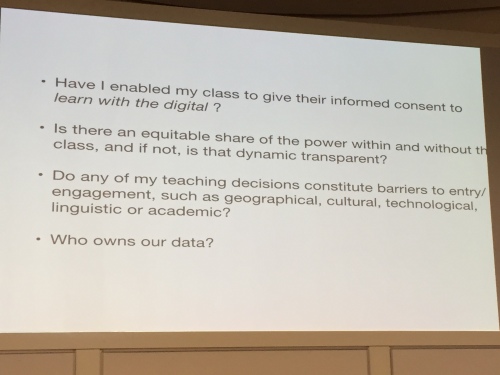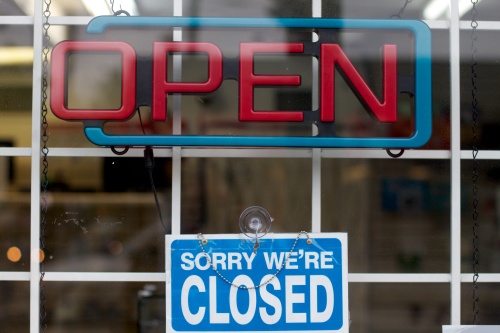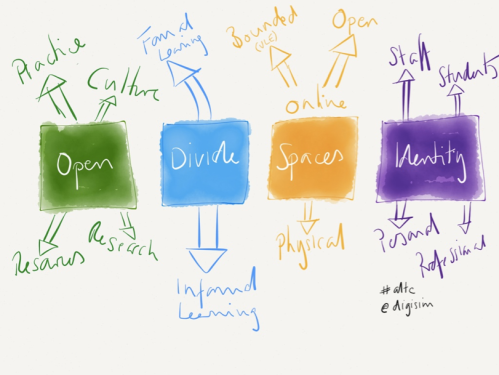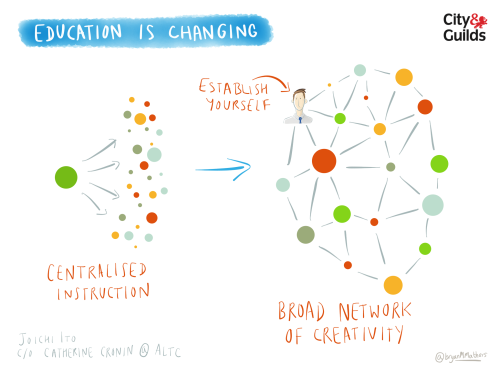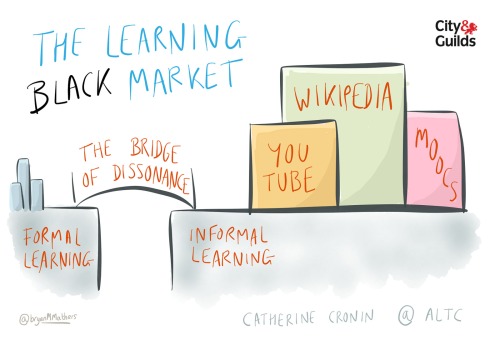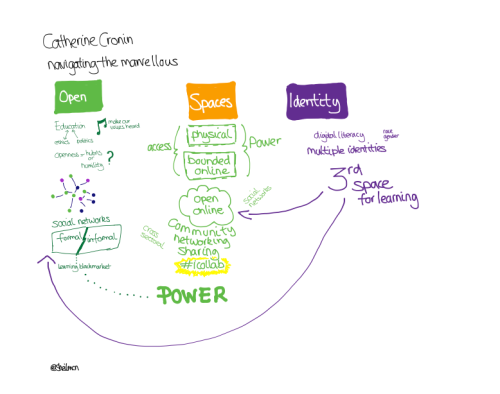Taking a broader view at #ALTC
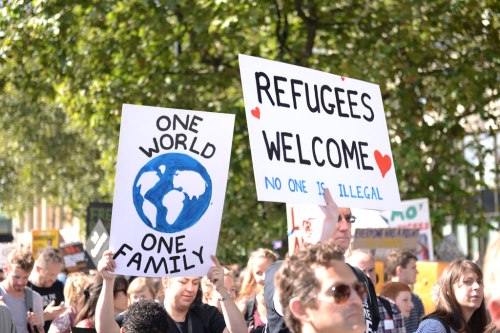
CC BY-SA iliasbartolini (London, September 12th, 2015)
Many of us talk of “blurring boundaries” in education — between online and offline, our classrooms and the world, formal and informal learning, the roles of learner and teacher, research and practice, etc. Yet at last week’s ALT Conference in Manchester, UK, another boundary was challenged. Thanks particularly to two excellent keynotes by Jonathan Worth and Laura Czerniewicz, we were invited to move beyond our immediate areas of focus as educators and researchers, and ask of ourselves: how can we renew the discussion and practice of education, particularly open/online/connected education, to address broader issues of injustice and inequality?
There will have been many experiences of ALTC. A few hundred people attended in-person and even more participated online — via the live stream, Twitter and/or Virtually Connecting. Maha Bali has written of her experiences at ALTC, Alan Levine of his story of connection, and Frances Bell of her experience of connection & disconnection. Some may view ALTC as a tech-focused conference, but this was not my experience. I attended for two of the three days and, as with any conference, could attend only a fraction of all the sessions. Yet the overall tenor of conference — judging from the two keynotes, the sessions I attended, and conversations with many others — was, to quote Donna Lanclos, one of people and pedagogy. And more than that, many speakers and participants discussed the challenging issues of power, ownership, agency and inequality with respect to further/higher education. In the face of current global humanitarian crises, these are urgent issues for us to address, both as educators and as citizens.
Jonathan Worth set the tone with his Day 2 keynote, acknowledging the vulnerability of learners and speaking openly of his own learning and vulnerability. Early in his career, Jonathan actively defended the copyright of his work. As digital photojournalism and the associated business models evolved, he began to see the difference between images (data, experiences) and photographs (physical artefacts). As he wove together ideas and stories, Jonathan drew a powerful connection between Photographers and Teachers. Both used to be considered one-to-many arbiters of meaning — but no longer. Yet both hold positions of relative power within Photographer-Subject and Teacher-Student relationships. As educators, we must acknowledge this and ask ourselves: “how can I empower people to tell their own stories?”. The most powerful part of this keynote was Jonathan’s honesty and humility about not only what he’s learned, but what he has yet to learn. His experience with Phonar helped him to realise that “learners together are more powerful than learners apart”, so he shared his questions with us, much food for thought:
Laura Czerniewicz‘s keynote on Day 3 was one which I will return to again and have already shared with others. In Considering Inequality as Higher Education goes Online, Laura noted how inequality pervades the entire landscape and she challenged us to create more inequality-informed practice, research, policy and advocacy. Drawing on Robin Mansell’s definition of two social imaginaries and Therborn’s Killing Fields of Inequality, Laura built a compelling picture of structural and global inequality. We require shared solutions to the challenges of inequality — particularly in further/higher education where, Laura noted: “the brutality of competition has opened a new era of global apartheid”. There are no simple solutions. We must do no less than reclaim the networked society. Education must be de-conolonised, in both face-to-face and online spaces. We should strive for more equal partnerships between the global North and global South. Open licensing and open practices provide some of the tools for this, but our main work is developing a deeper understanding of inequality and committing ourselves to challenging it, in all our work.
I highly recommend reading Jenny Mackness’s post The Micro and the Macro of the EdTech World in which she reflects on both keynotes. There’s also an extended comment from Jonathan Worth here — well worth reading.
Though not physically present at the conference, the important work of Audrey Watters, Kate Bowles and Paul Prinsloo was discussed during they keynotes and throughout the conference, as well as a recent blog post by George Siemens — all highlighting issues of trust, care, and equity/inequality. Other conference sessions which touched on these themes included:
- In what I hope is just a first outing for an insightful piece of work, David Kernohan dug into the past and future of educational technology: “I watch the ripples change their size but never leave the stream”.
- Peter Bryant, Chris Fryer, Darren Moon & Malte Werner described a MOOC developed at LSE which invited people to crowd source a constitution for the UK: Learning, community, digital citizenship and the massive in a post-MOOC world.
- Donna Lanclos and Dave White, among many other things, highlighted learner vulnerability and the importance of creating a culture in which all students feel more comfortable about “not knowing” and about asking for help and support.
- Antony Coombs described ongoing work at the University of Greenwich in relation to open educational practices (OEP) and shared a draft version of the university’s Position Statement in relation to OEP.
- Sarah Honeychurch, Ashley Shaw, Rebecca Hogue & Maha Bali shared their #rhizo14 experiences, exploring their understandings of community, connection and trust: A herd of freely associating, autonomous cats: how a Facebook group helped turn a bunch of cMOOC participants into a learning community.
- On the final day of the conference, Viv Rolfe and myself shared some of our ideas on open education within further/higher education, and the importance of advocating for openness not as an end in itself but as a means to more ethical practice and equity. A summary of our session and the wiki we created is available here: Going Open at ALTC 2015.
These were just a few of the highlights of the conference for me. I missed other sessions I would have loved to attend by Helen Beetham, Steve Wheeler, Terese Bird, Andrew Middleton, Paul Gormley, Sheila McNeil, Sue Beckingham, Chrissi Nerrantzi, and others. In-person, online, and hybrid conversations (looking at you, Maha Bali and @VConnecting!) enriched the conference in so many ways. Warm thanks to all.
Image source: CC BY-SA Ilias Bartolini – One world, Refugees welcome (Flickr)
